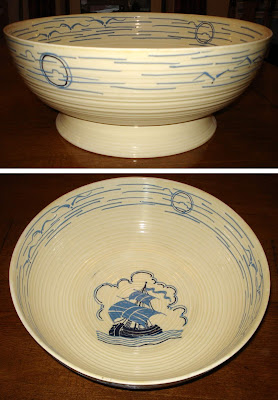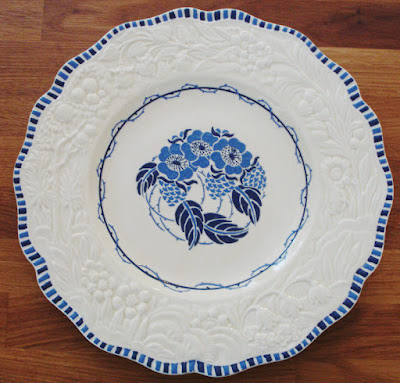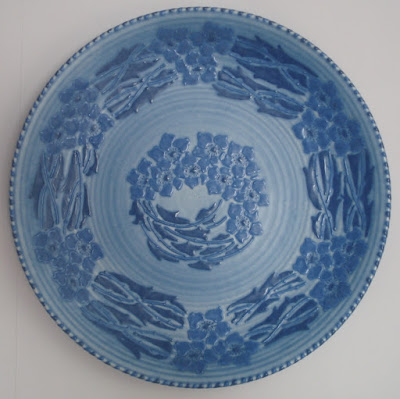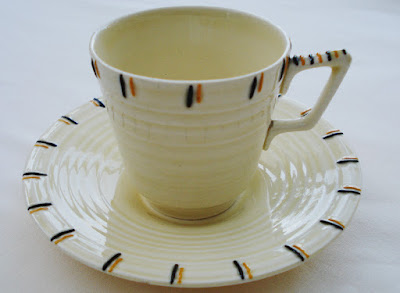Whilst gathering material for the post on stitched edged designs I got distracted into looking at Charlotte Rhead’s tube-lined designs that used more than one colour slip. I have a feeling that this may have been quite a big deal at the time. We know that pattern 3049 is Charlotte’s first design that uses more than one colour slip clay. The stitched edge Cotswold tableware in orange and black became a good long running seller, possibly in production for 20 years.
I think that Charlotte put a lot of effort into exploiting the success of this technique to create other designs with multiple slip colours. None of these efforts came close to the success of pattern 3049, but I think she was motivated by being able to produce a product her competitors could not match. In the 1930s the pottery companies were copying each others designs without let or hindrance. But surely Richardson’s must have had an edge when it came to tube-lining because of Charlotte’s clever designs and her team of tube-liners.
Bernard Bumpus discusses tube-lining with multiple colour slips clays in his article “Tube-line Variations” in the magazine, Antique Collector of December 1985. He reports how Jack Butler, who succeeded Frederick Rhead as art director at Woods in 1929, may have produced the Galleon charger using slip clay in three colours, (blue, black and brown). The charger is illustrated in the magazine and also a different example in plate 96 of "Collecting Rhead Pottery". The charger would have been made around 1930 and Charlotte would certainly have been aware of it and what other designers were producing with the tube-lining technique.
 |
| Jack Butler charger |
Her role at Richardson’s was to produce commercial patterns rather than expensive art pottery, so she adapts the idea of multiple colour slip into a simple design that would not stretch the tube-liner too much and could produce it at an acceptable price. It does not appear that any other company was producing tube-lined tableware at this time. This is another example of Charlotte using her artistic skills and her team of tube-lining decorators to create a commercial success that Richardson’s competitors would find difficult to emulate.
Most of the 40-50 or so designs in the pattern books that use more that one slip colour are tableware. This is quite strange since tube-lined decoration is not resilient to the wear and tear of use especially with cutlery. Perhaps that is why the stitched edge Cotswold design was the only one that was popular and practical to use.
The patterns can be said to fit into 4 categories:
- Tableware usually on the Cotswold or Queen Anne shape
- The large salad bowls and platters for the USA market, (also referred to as punch bowls and 17” chargers)
- Cabinet plates – ie tableware plates decorated with fancy designs for display only
- Fancies using Charlotte Rhead’s typical shapes for tube-lined decorative ware
I have written about some of these patterns before in my post on stitched edge tableware. In particular there are comments about 3049, 3172, 3260 and notes on some of the as yet undiscovered designs.
https://rhead-crownducal.blogspot.com/2017/03/tube-lined-stitched-edged-tableware.html
3049 (Niva) Stitched edge in orange & black on Cotswold tableware and large salad bowls and platters.
 |
| Pattern 3049 Niva |
3169 Tree centre with large stitched edge in orange & black on large salad bowls and platters.
 |
| Pattern 3169 |
3170 Dragon centre with large stitched edge in orange & black on large salad bowls and platters.
3172 Tree centre with large stitched edge in Danube and matt blues & salmon on large salad bowls and platters. A special pattern because it is believed to be Charlotte's only Crown Ducal design with 3 slip colours.
 |
| Pattern 3172 Tree Centre |
3187 Trailing feather in orange & black on Cotswold tableware. Probably a very difficult pattern to tube-line. Even though the design is simple it must have required a skillful hand to tube-line the second colour adjacent to the first.
 |
| Pattern 3187 |
3191 Galleon in Danube and matt blues on Cotswold tableware and large salad bowls and platters.
 |
| Pattern 3191 Galleon |
3205 Trailing laurel border and dots in Danube and matt blues on large salad bowls and platters. The picture shows the same design in single colour black slip, the pattern number of which is unknown but demonstrates the design was produced. Pattern 3205 would look like the border of 3218.
 |
| Pattern 3205 |
3212 Alternate lines in orange & black on Cotswold tableware.
 |
| Pattern 3212 |
3218 Blossom centre with trailing laurel border and dots in Danube and matt blues on large salad bowls and platters.
 |
| Pattern 3218 Blossom |
3257 Blossom centre with large stitched edge in Danube and matt blues on large salad bowls and platters.
 |
| Pattern 3257 Blossom |
3258 Blossom centre with large stitched edge in orange & black on large salad bowls and platters.
 |
| Pattern 3258 Blossom |
3260 Florentine centre, intertwined stems and dentilled edge in Danube and matt blues on No3 cabinet plate.
 |
| Pattern 3260 |
3582 Y shaped edge motif edge in orange & black on Queen Anne tableware.
 |
| Pattern 3582 |
3584 (Perth) Scrolls and stars in orange & black on Queen Anne tableware.
 |
| Pattern 3584 Perth |
4517 (Blossom) in Danube and matt blues with off blue glaze on fancies.
 |
| Pattern 4517 Blossom |
4538 (Blossom) in Danube and matt blues with snow glaze on fancies.
 |
| Pattern 4538 Blossom |
4898 Paired short lines in orange & black on Cotswold tableware.
 |
| Pattern 4898 |
4901 Dot & dash line in orange & black on Cotswold tableware.
 |
| Pattern 4901 |
4902 Wavy lines and dots orange & black on Cotswold tableware.
 |
| Pattern 4902 |
